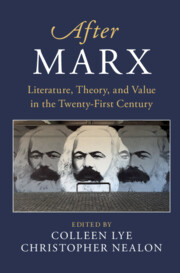Book contents
- After Marx
- After Series
- After Marx
- Copyright page
- Contents
- Contributors
- Acknowledgments
- Introduction
- Chapter 1 Black Marxism and the Antinomies of Racial Capitalism
- Chapter 2 Eco-Criticism and Primitive Accumulation in Indigenous Studies
- Chapter 3 Screening Insurrection: Marx, Cinema, Revolution
- Chapter 4 Marxist Ecology and Shakespeare
- Chapter 5 There Is No “More Commodification”: Periodizing Capitalist Transformation
- Chapter 6 The Irreconcilable: Marx after Literature
- Chapter 7 The Rise and Fall of the English-Language Literary Novel since World War II
- Chapter 8 Literature and the State
- Chapter 9 Post-Soviet Aesthetics
- Chapter 10 Lu Xun’s Literary Revolution in Chinese Marxism
- Chapter 11 Latin American Literature and Dependency Theory Today
- Chapter 12 Industry Culture: Labor and Technology in Marxist Critical Theory
- Chapter 13 In Service to Capital: Theater and Marxist Cultural Theory
- Chapter 14 Hidden Abodes and Inner Bonds: Literary Study and Marxist-Feminism
- Chapter 15 Poetry and Revolution
- Index
- References
Chapter 3 - Screening Insurrection: Marx, Cinema, Revolution
Published online by Cambridge University Press: 12 March 2022
- After Marx
- After Series
- After Marx
- Copyright page
- Contents
- Contributors
- Acknowledgments
- Introduction
- Chapter 1 Black Marxism and the Antinomies of Racial Capitalism
- Chapter 2 Eco-Criticism and Primitive Accumulation in Indigenous Studies
- Chapter 3 Screening Insurrection: Marx, Cinema, Revolution
- Chapter 4 Marxist Ecology and Shakespeare
- Chapter 5 There Is No “More Commodification”: Periodizing Capitalist Transformation
- Chapter 6 The Irreconcilable: Marx after Literature
- Chapter 7 The Rise and Fall of the English-Language Literary Novel since World War II
- Chapter 8 Literature and the State
- Chapter 9 Post-Soviet Aesthetics
- Chapter 10 Lu Xun’s Literary Revolution in Chinese Marxism
- Chapter 11 Latin American Literature and Dependency Theory Today
- Chapter 12 Industry Culture: Labor and Technology in Marxist Critical Theory
- Chapter 13 In Service to Capital: Theater and Marxist Cultural Theory
- Chapter 14 Hidden Abodes and Inner Bonds: Literary Study and Marxist-Feminism
- Chapter 15 Poetry and Revolution
- Index
- References
Summary
This essay develops from the hypothesis that the relationship between Marx and cinema is mediated by a shared investment in the revolutionary subject, a collective being capable of abolishing capitalism, insofar as its liberation necessitates total demolition of the standing social order, from which an egalitarian organization of society might then develop. Beginning in Russia after 1917, when cinema was used as a material force to organize workers and peasants, the essay’s first half tracks the way that a cinematic emphasis on the industrial proletariat has been replaced, or superseded, by an emphasis on what Marx and Engels described as a relative surplus population. The essay’s second half illustrates this shift with reference to two popular films, released into the apparent fall of American economic hegemony, approaching them as ensigns of an economy in terminal crisis wherein revolutionary subjectivities might be forged out of the otherwise disaggregate members of the surplus population.
- Type
- Chapter
- Information
- After MarxLiterature, Theory, and Value in the Twenty-First Century, pp. 55 - 70Publisher: Cambridge University PressPrint publication year: 2022



